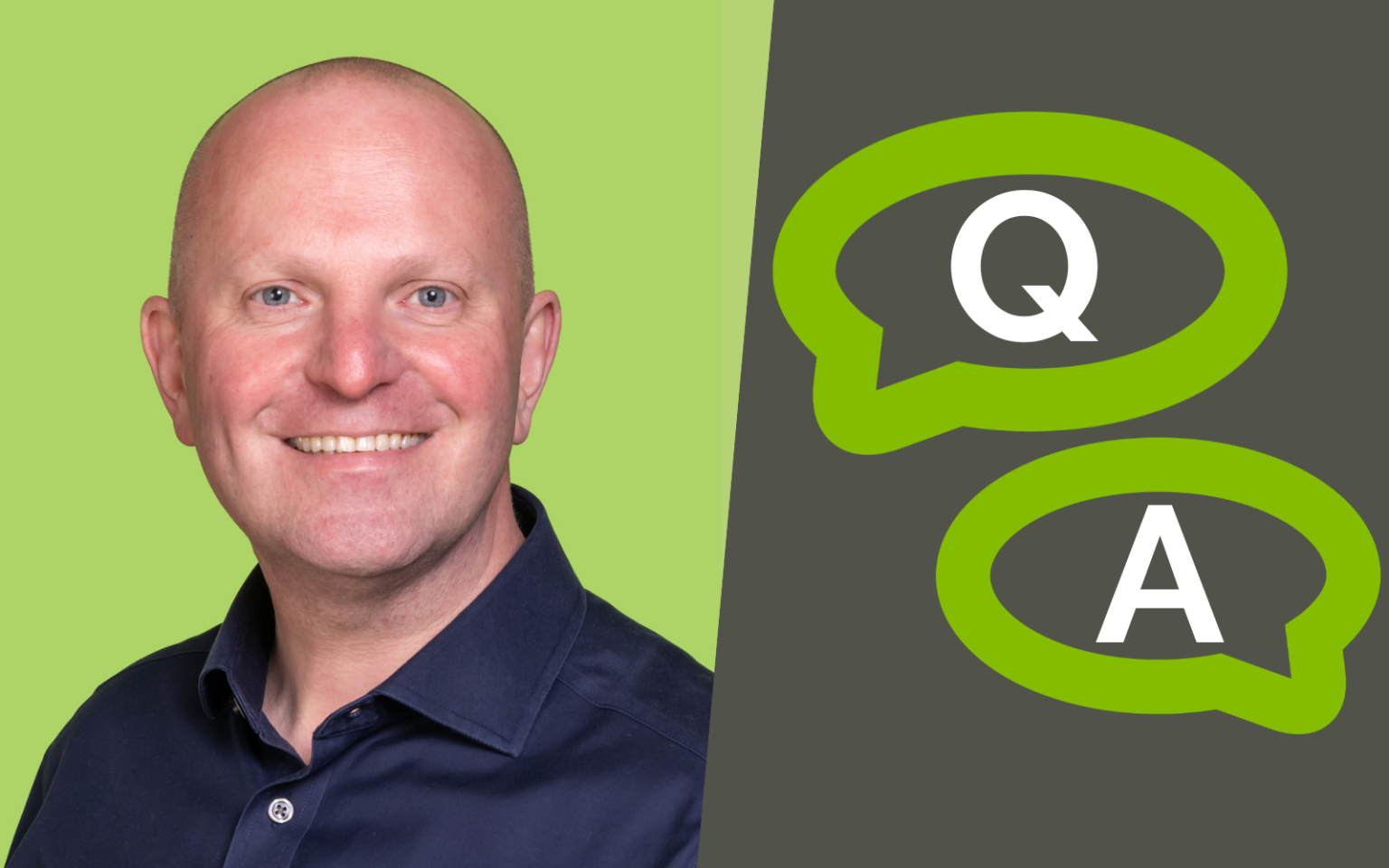My Career In IT Recruitment: Q&A With VIQU’s MD Matt Collingwood

With a career in IT recruitment spanning nearly three decades, and multiple achievements, awards, and successes along the way, Matt’s story from Recruitment Resourcer to Founder and Managing Director of VIQU is a fascinating tale.
I was pleased to sit down with Matt to gain his insights into the world of IT recruitment, his future plans for VIQU, and what invaluable advice he has for anyone wanting to start a career in recruitment.
How did you get into recruitment?
Matt: Like most people, I stumbled into a career in IT recruitment. I knew I wanted to work in sales, so I registered with a few sales recruitment agencies. However, they tended to overpromise and underdeliver. I went to an interview with a recruitment company called Computer People, having already decided that I didn’t want the role and should just attend for the interview practice. The business was a market leader at the time and the interviewer, who became my boss and early mentor, really inspired me. He made me see that recruitment focuses on a solution sell, rather than a product sell. I liked the sound of that, so I cancelled my other interviews and undertook a 5 stage interview process to get the job!
What was your biggest mistake when starting out?
Matt: My biggest mistake, early in my career in IT recruitment, was putting all my eggs in one basket. I invested most of my efforts and energy into one successful client. They were focusing on Y2K projects (the Millennium Bug), which, of course, had a shelf life. Whilst that account did fantastically well and helped me exceed my weekly and monthly targets, it didn’t last forever.
I regularly see other recruiters make the same mistake – servicing just one account and neglecting business development. This often brings short-lived success. My advice is to always identify what your next client looks like, and devote time to reaching out to new businesses and individuals.
How do you think recruitment has changed over the years?
Matt: Recruitment has changed significantly. Early in my career in IT recruitment, it would take two weeks for my roles to be advertised in trade journals and then to receive candidate CVs via fax and post. When online job boards and LinkedIn became widespread, people thought that would be the end of recruitment. In fact, it only helped recruiters grow, with us learning to utilise these services to offer quicker solutions to businesses. Nowadays, we hear that AI will replace recruitment. Don’t get me wrong, there are definitely ways an AI generator can work faster and more productively than a recruiter. However, I believe in the same way recruiters used job boards to advance their abilities and services, we will use AI in the same way eventually. However sophisticated AI becomes, it can never remove the personal touch candidates expect from a good recruiter.
When I first started in the industry, it was largely unregulated and felt a bit like the Wild West! However, in the past decade or so, there have been changes to laws to protect candidates and clients, such as AWR and The Conduct of Employment Agencies and Employment Businesses Regulations 2003. I believe this has brought trust and accountability to the sector.
I’ve also seen an attitude shift in the industry. Some people are attracted to recruitment because they see it as akin to HR and helping people. We do support professionals and can have a significant impact on lives, however, it’s important to remember that a career in recruitment is a career in sales. The job requires drive, motivation, and being comfortable with asking difficult questions. Individuals who feel discomfort in ‘selling’ will struggle with meeting targets. If you enter the sector knowing it’s a sales job and have those characteristics, you’ll do well.
What made you want to set up your own recruitment agency?
Matt: After 17 years at my first company, I had moved up the ranks and learned a lot along the way, but I was ready to do something bigger and better. In my opinion, the business I was in at the time was too soulless and corporate. I wanted to create a people-centric business that was difficult to join but even harder to leave!
At the start of my career in IT recruitment, I wanted to prove that I was an excellent recruiter, and then later I wanted to show that I could run my own business. We’ve grown the business to a current turnover close to £20m, successfully expanding our services and capabilities.
What are your plans for VIQU?
Matt: I often get asked by other recruitment agency owners how many staff members I have. I know why they ask this – the idea is the bigger the team, the more successful your recruitment agency is. However, comparing staff numbers is a vanity project. I like to focus on staff retention. I want to find people who fit the VIQU mold, keep them motivated, and ultimately, create a business where they can thrive. That’s my main focus in my business planning.
On a personal level, I am looking towards more succession planning. I’d like to reduce my hours at some point in the future. I have a great team of Directors and I want to eventually move the company to them to continue to grow and enjoy the success. I would never be interested in selling the business, but I want the business to carry on beyond me.
What have been your career highlights so far?
Matt: I’m proud to say there have been so many, it’s hard to speak to them all here.
Professionally, before founding VIQU, I was the highest billing recruiter that my company of over 600 staff had seen in their 45 years of trading, creating a gross profit of £1.45 million in a single year. I was also the most decorated technology recruitment manager at the company, winning many awards based on my team’s performance. These achievements helped me to believe that creating a successful and award-winning recruitment agency was possible.
Overall, one of my biggest achievements was how we dealt with the Covid pandemic. I remember many recruitment agencies taking advantage of being able to furlough team members. We took a very different approach. Instead of furloughing our teams, we used our resources to create the VIQU IT Volunteer Initiative. Through this, we introduced out-of-work IT professionals to NHS trusts that were overwhelmed by the prospect of remote working during the pandemic. In total, we saved the NHS approximately £1.95 million and gave temporary opportunities to 260+ IT professionals, many of whom secured paid work due to our initiative. We also promised all our colleagues that we would protect their jobs, salaries and to make no financial cuts when most of our competition were focused on self-preservation.
Other highlights include buying VIQU’s office buildings in Birmingham and Southampton, and creating high-quality work environments where our teams can thrive long-term. Additionally, we were one of the first UK recruitment agencies to identify a new proactive approach to our clients’ skills gaps issues, supporting businesses to navigate the Home Office Skilled Worker visa system efficiently.
Do you have any advice for someone considering a career in IT recruitment?
Matt: My advice to those considering a career in IT recruitment is to:
- Have a purpose for wanting to be successful. This could be wanting to buy nice cars, a house, putting your kids in private schools, looking after family etc. A motivation will help to propel you. Your career becomes the vehicle to achieve those goals.
- Be accessible. By this I’m not saying you need to be on-call 24 hours a day. However, this career is demanding so you do have to be flexible when speaking to candidates at times that suit them. I’ve always made myself available outside of hours to candidates who cannot speak during the day, and I’ve felt that this gives me an edge over recruiters who are off the clock until the next day.
- Learn from a mentor. Having a mentor who is one of best in their field will help with your own success. You don’t want to be a carbon copy but by learning from their success, you can develop it to help yourself.
- Build relationships and a network. Social media is an amazing tool, however, it shouldn’t replace meeting and talking with people face-to-face. I feel like this has become something of a lost art in recent years.
- Be comfortable being uncomfortable. A career in IT recruitment often means having very difficult conversations and people saying no to you. You need to ask people awkward questions to get the information you need. If you don’t think you’ll ever be at ease in those situations, recruitment might not be for you.
If you are considering a career in IT recruitment, please click here to contact our Head of Talent, Melinda Queck. To gain further insights into what a career in IT recruitment looks like, check out our blogs here.
Similar articles you might like...

Getting The Work-Life Balance In Recruitment Right
Having a great work-life balance in recruitment is not always easy, but it is fully achievable by understanding how to disconnect, focusing on personal achievements, taking breaks and more.

Getting Started In Recruitment: Q&A With Jack Mcmanus
Interested in getting started in recruitment? Jack explains how he knew that the recruitment industry would suit him and gives a reflection of his time at VIQU.
Latest jobs
Full Stack Developer
 Glenrothes, United Kingdom
Glenrothes, United Kingdom
 £40k - 50k per year + Bonus
£40k - 50k per year + Bonus
Full Stack DeveloperSalary: £40,000 - £50,000 per annum plus bonusGlenrothes, Scotland (Full time on site)VIQU have partnered with a leading organisation who are looking to recruit a full stack developer join their development team. The...
Site Supervisor
 Stone, United Kingdom
Stone, United Kingdom
 Market related
Market related
Job Title: Site Supervisor Location: Stone (on-site)- must have full UK Driving License. Salary: market- relatedVIQU has partnered with a top engineering company seeking a Site Supervisor to create and manage project plans. The...
Site Manager - Nuclear Division
 Staffordshire, United Kingdom
Staffordshire, United Kingdom
 Competitive Salary
Competitive Salary
Site Manager - Nuclear Division - Competitive SalaryLocation: StaffordshireVIQU have partnered with a company that has been leading the charge in advanced system integration for decades. The Role:We're looking for an experienced Site Manager with strong...
Telephony Engineer
 Cardiff, United Kingdom
Cardiff, United Kingdom
 £35k - 45k per year
£35k - 45k per year
Telephony Engineer - 12 Month FTC – £35- £45,000 Location: Cardiff (Minimum 3 days on-site) Company: VIQU - Partnered with a Public Sector OrganisationVIQU is working with a Public Sector client to find an experienced...
Solution Architect
 London, United Kingdom
London, United Kingdom
 £650 - 750 per day + Inside IR35
£650 - 750 per day + Inside IR35
Solution Architect – Workplace Modernisation – 12 months ContractA Global Firm are at the start of a Workplace Modernisation programme of work and require a Solutions Architect to join the team and help design this...


